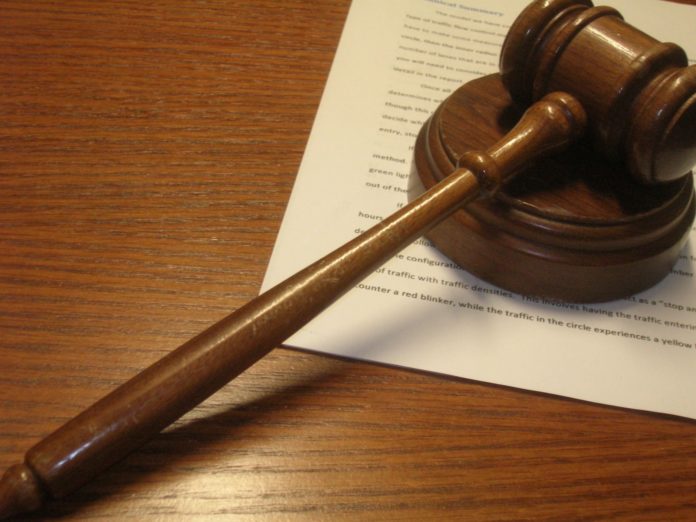The first day of the weeklong jury trial in Whitley County Circuit Court had several hiccups throughout the day, including a motion to continue and technical problems.
Courtney Kincaid, 30, Columbia City, is charged with aggravated battery, a Level 1 felony; neglect of a dependant resulting in death, a Level 1 felony; and battery resulting in death to a person less than 14 years old, a Level 2 felony, after 11-month-old Emma Grace Leeman, of Pierceton, allegedly died in her care on April 12, 2018.
Whitley County Prosecuting Attorney DJ Sigler is representing the State of Indiana, and Kincaid is represented by Preston Bradley Baber and Zachary Preston Baber, a father-son team from Baber & Baber PC in Columbia City.
The trial – in Whitley County Circuit Court Judge Matthew Rentschler’s courtroom – is being held virtually due to COVID-19 and the small courtroom being unable to socially distance members of the public who wish to spectate, or members of the press. The trial is made available to livestream at https://public.courts.in.gov/incs#/.
That livestream worked well for the majority of the day during the jury selection process. By 2 p.m., a 12-person jury made up of five men and seven women, and one male and one female alternate, were sworn in.
Of the 70 potential jurors called to report for possible jury duty, they were all told they would need to be comfortable wearing a mask for eight hours a day for five days in a row, be able to handle looking at graphic photos of a dead infant and be able to separate emotions from facts when deciding Kincaid’s guilt.
The jurors also were asked questions about underlying health issues they or someone in their home may have that make them more susceptible to contracting COVID-19, such as a person 65 or older. Jurors with any underlying health issues or concerns about the virus were able to be excused.
Before the lunch break Monday, and after the potential jurors were out of the room, Kincaid’s attorneys filed a motion to continue the 2-year-old case and put Kincaid on the stand.
Kincaid testified that over the weekend her daughter had a high fever, became ill and she took her to the emergency room where her daughter was tested for Influenza A, Influenza B, Strep throat and COVID-19. The COVID results are pending, she said.
Kincaid said that on July 12 her family attended her sister-in-law’s father’s birthday party, where they were “hugging and in close contact,” and that she found out on Friday he had tested positive for COVID-19.
Kincaid’s attorneys argued that the case should be continued because of that, with Zach Baber citing an article he read over the weekend where White House Coronavirus Task Team Dr. Deborah Birx met with the Kentucky governor and said the pandemic is “surging” in Kentucky and Indiana and people should not gather in groups more than 10.
“You’re not sick are ya?” Sigler asked Kincaid, to which she replied, “No.”
“And your daughter has a virus. In your experience, children get viruses, don’t they? And in fact, they get non-COVID viruses,” he said. “And as you sit on that stand right now, you can’t say that your daughter has COVID-19, can you?”
Sigler also doubled down and asked her if her daughter were to be ill that Kincaid lives with her parents and her husband, who are more than capable of helping take care of the child, to which Kincaid said yes. He also asked her if she or any of the other adults in the home got tested for COVID.
“No,” she said.
“It just seems strange to me, Mrs. Kincaid, that since you’re so concerned about COVID-19 that neither you or your husband have been tested. Does that seem strange to you?,” he asked.
“No,” she said.
“I’m sure it doesn’t,” Sigler said, then cited her past continuations over the last two years. “If this concern was real, she would have gotten tested. Nobody else did either. This is another 11th hour, hail mary, get-out-of-jail-free card attempt,” Sigler told the judge. “I strongly, I vehemently oppose this. … She has had her bite at that apple. The time has passed. I am comfortable and confident that the court has done beyond what other courts have done to make sure of the safety of our jurors and our staff.”
Rentschler denied the motion to continue the trial and said the court has done a tremendous amount of legwork to make the trial possible, and as far as Kincaid’s attorney citing a news article quoting Birx, Rentschler said he’s taking his ways to operate from the Whitley County Health Department. He also told Kincaid to keep the court aware of the child’s test results.
After the jury was sworn in, Sigler gave his opening statements and said this case is about an 11-month-old child who could not defend herself, could not care for herself, and who was killed by having “her skull bashed against a hard, flat surface.”
Sigler said Kincaid confessed on May 29, 2019, 412 days after Emma Grace died.
“She confessed,” he said. “It was not some oblique confession, not words that we don’t know their meanings, not some jabbery lunacy. ‘Oh my god, what did I do,’” Sigler said. “She hit her head first, I laid her down as hard as I can,” he alleges was Kincaid’s confession.
He accused Kincaid of changing her story several times throughout the investigation, and noted to jurors that Emma Grace’s death was ruled a homicide and said they can expect to hear from medical doctors and experts throughout the week.
Sigler also talked about how Kincaid agreed to take a polygraph test and that deception was indicated.
“This is a violent act perpetrated against a child,” he said. “I did not charge Courtney Kincaid with murder. I have charged her with battering her to death, because that’s what the science, the corroboration, that’s what the medicine tells us.”
Sigler then raised his arms in the air and shook them then violently, then motioned in a throwing action to the floor. “That’s the science,” he said.
“Over this week, the evidence will show that Courtney had been babysitting young kids off and on since the age of 15,” Baber said of his client, saying she became a full-time babysitter in August 2017 and that Kincaid has three children of her own. “Courtney did not believe in physically disciplining her kids or any kids. She babysat for multiple parents over this eight-month span. She took care of the children.”
Baber then told jurors about the times that Kincaid agreed to speak to police after the incident, sometimes for hours at a time. He said Kincaid did not have a lawyer on Aug. 9, 2018, when police asked her if she would take a polygraph test. He said Kincaid agreed to do that and signed legal documents making the polygraph test and results admissible in court.
“She was interviewed for five hours and 48 minutes in that polygraph building,” Baber said. “She did tell them a different story,” he acknowledged to jurors.
“Later that same month, on Aug. 27, 2018, Courtney’s asked again to go back to the police station, where she’s interviewed again,” Baber said, where she also told a different story. Baber said Kincaid was interviewed at that time for more than two hours.
“Over this week, you’re going to hear from laymen, police officers, medical personnel and a professor,” he said. Baber said the professor “will explain that contrary to popular belief, sometimes people confess to crimes they did not commit, and interrogation techniques used by law enforcement can sometimes lead to false confessions. At the end of the week … I’m going to ask you to find Courtney not guilty of all the charges against her.”
Next, Sigler called the state’s first witness to the stand: Sherry Leeman, the mother of Emma Grace. After Sherry, the state called Nick Leeman, Emma Grace’s father.
Unfortunately, due to the state-run livestream server having technical problems, the trial was unable to be viewed during their testimonies. No further information was made available to the media about what the problem was, or when it will be fixed.
If Kincaid is convicted of all charges, she faces more than 100 years in prison.





